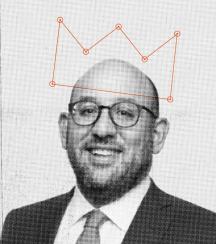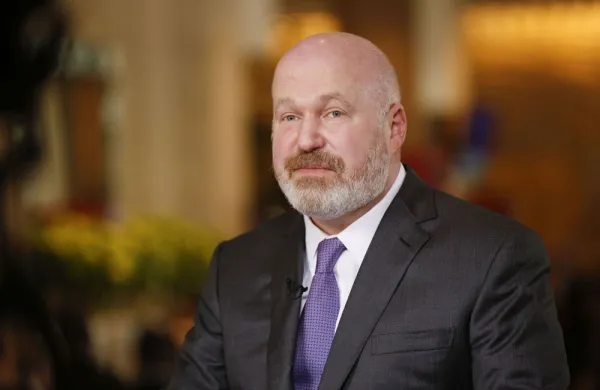
Illustration by Matt Chase/Photography courtesy AQR Capital Management.
Jeremy Getson is no one’s idea of a slick networking pro.
“I’m not even sure he owns a suit,” remarks one suit-wearing insider. “Jeremy is the real deal. No BS.” Getson leads North American sales for AQR Capital Management, the quantitative investment powerhouse he joined 14 years ago when it was a fledgling boutique.
But you probably already knew that.
In an industry that runs on relationships as much as alpha, Rolodexes are power. They’re what saves hedge funds from redemption death spirals when the alpha part isn’t working. They’re how institutional allocators find out that a manager’s succession plan is falling apart. They’re everyone’s first line of defense and their last hope when bets, markets, or bosses turn bad. Who are you going to call?
If you were Jeremy Getson, you could call most anyone. But you wouldn’t need to.
Getson leads a rarefied class of the ultraconnected in a disparate industry, according to dozens of investors, competitors, trade reporters, and other insiders. Narrowly behind Getson is Jaime Hobbeheydar — chief marketing officer of Paul Singer’s Elliott Management — who’s admired for many of the same reasons. “Jaime is a great guy, and among marketers he’s the one,” says a former colleague. Compared with the norm in his role, “Jaime’s more low-key.” Or as one finance veteran puts it, “He is a little bit of an enigma.” Hobbeheydar formerly led client service at Bridgewater Associates, a firm much lauded by investors for the quality and investment knowledge of client service staff.
David McCormick, Bridgewater’s co-CEO and another contender for Most Connected, is said to adhere to the client service culture with military discipline, speaking to investors most days. “People would pick up the phone when he called,” a recommender notes. “West Point grad, circling around Davos.”
READ FURTHER: The Four Types of Marketing Mavens You Meet in Asset Management
Then there’s Getson.
“AQR changed the way we invest, and I think Jeremy was the tip of the spear,” says Dominic Garcia, chief investment officer of New Mexico’s $16 billion employee pension fund. Before becoming a CIO, Garcia spent nine years building a $5 billion hedge fund portfolio from scratch at Wisconsin’s state fund. He’s met everyone that matters in the industry ($5 billion will do that). Asked to name the best-connected people in the game, he singles out Getson for not just the volume of his investor relationships, but also their impact.
“Jeremy did the road show on factor investing and alternative beta before most institutional investors really knew what they were,” Garcia remembers. “They built that niche. And he was the boots on the ground, getting it done with all of us allocators. A lot of us have adopted the philosophy that AQR and Jeremy helped introduce.” And, Garcia adds, “he’s very personable.”
Before AQR’s recruiting trip to the University of Chicago in 2004, Getson didn’t know much about the firm and didn’t much want to work in sales. At the time, AQR managed just $12 billion — or 5 percent of its current $224 billion. Co-founder David Kabiller was the one-man fundraising band for AQR’s first five years, knowing that when he built out a sales team, he couldn’t hire “salespeople.”
“I wasn’t going to add the person who loves to play golf and schmooze,” Kabiller says. “I find it repugnant, that whole notion of selling ice to an Eskimo.” In 1998 he left Goldman Sachs with three colleagues — Cliff Asness, Robert Krail, and John Liew — and their hotshot track records. “When we started AQR, I felt there had to be mutual respect and a real partnership between sales and research. Sometimes in money management, the researchers are the ‘smart people’ and sales people go out and schmooze clients.” At AQR everyone had to be smart.
Kabiller’s first hire sent a shot across the bow. “Gregor was a strong statement to our colleagues in research,” the founder remembers. Gregor Andrade: Harvard Business School professor, University of Chicago Ph.D. in finance, MIT undergraduate. With no sales experience or investor network, he became one half of AQR’s distribution team in 2003, and leads international coverage to this day.
If Andrade set the template for AQR salespeople, Jeremy Getson proved the concept. “We went to the University of Chicago” — both Asness and Liew earned Ph.D.s there — “and I must have interviewed 12 people that day,” Kabiller says. At the end of the interviews, “I’d ask them, Who’s the smartest person in your class? And a number of them said, ‘Jeremy.’ I remember meeting him — he can be a touch quirky, but his sense of humor, his substance, and his deep insight into finance are on par with many of the Ph.D.s I’ve seen.” The Harvard professor concurs. “Jeremy took the harder classes and did very well. And you can get an MBA from Chicago without taking those classes,” Andrade points out with mild distaste.

Getson’s second-round interview still triggers anxiety in him, 14 years later. “They flew four or five of us out from Chicago to New York, which means you get up at like 3:00 a.m., fly in, and they put you in a conference room with a huge fruit platter on the table. Then surprise! ‘We’re giving you a finance test.’ It was 50 questions or so, very finance-specific. That came out of the blue,” he remembers vividly. He got the job.
On a rainy winter day in the Greenwich, Connecticut, offices, Getson, 46, is in jeans, a fleece AQR vest over a blue-checked button-down, glasses, and about five days of stubble. Given the choice between redoing that interview and enduring my probes about “relationship-building techniques,” he’d be torn.
Getson did not ask for this profile. He appears to have been browbeaten into participating, whereas his colleagues jovially talk about him. How did Getson turn his nonexistent network and AQR’s complex quantitative products into the industry’s best and biggest?
Kabiller: “People like him, they trust him, they respect him. They like him because he is affable, funny. They trust him because he’s always honest, doesn’t BS them. He’s not about sizzle; he’s about substance. He’s got a good pedigree. Jeremy has that within himself. But equally as important, he’s armed with insights and research that make them better investors. Tom Brady’s obviously supergifted, but without an offensive line, he’s not doing what he does.”
In the years postcrisis, what Getson, as one of a handful of players covering the whole distribution field, was doing was travel. He estimates he spent 60 percent of his nights in hotels during that period. “We were going anywhere — every win was great. I got very good at red-eyes.” Approaching his 40s, Getson found that that pace of travel began to wear on him, he acknowledges. Now, with a team to support him and help cover ground, he travels less, but still racks up 100 or so days a year. “I’ve become more of a player-coach,” he says. And he’s a father of two, a 9-year-old and a 12-year-old.
READ FURTHER: The Four Types of Marketing Mavens You Meet in Asset Management
Herein is the price of maximizing an inborn gift for connection, like Jeremy’s: time. The hedge fund industry demands more of it than most. In venture capital entire funds can be raised, deployed, exited via SoftBank, and then exaggerated to raise fund II, all without the manager having to leave the Rosewood Hotel bar on Sand Hill Road. But for hedge fund general partners, investors, and servicers in that orbit: Pack a bag and call a black car. This relationship game is still best played in person.
“I like to come into initial meetings with ten ideas for discussion, none of them being AQR products, and ask what they’re interested in talking about,” Andrade says. “And that’s the conversation we have.”
Institutional allocators often prefer to conduct manager discussions face-to-face. They find in-person value not so much in what a manager says (which could be communicated over the phone), but rather in what the manager does while saying it.
“How a person comports themselves tells a lot about how they will treat you as a client,” says Eric Nierenberg, chief strategy officer for Massachusetts’ retirement system. “I notice when the fund manager doesn’t wash his hands in the bathroom (yes, really, multiple times, including some very well-known people), whether their kitchens are well stocked with free snacks for their employees, and to what extent they blame others for their own shortcomings and failures. I don’t have to like the person personally, but how they treat subordinates/spouses/etc. matters a great deal.”
Nierenberg oversees a roughly $6 billion hedge fund portfolio with dozens of general partners, including Glenview Capital, PAAMCO, Elliott Management, and yes, AQR. “My take on it — but I’m biased as a behavioral economist — is that all business relationships require a measure of trust,” he explains. “You can’t write contracts to cover everything.” Handwashing, for instance.
Put another way, relationships are what happen during and after deciding someone’s trustworthy. They’re a side effect of trust, not the source of it. The ickiness of old-school sales comes from the notion that relationships build trust. If you buy someone enough steak dinners, he’ll feel like your friend, and will reciprocate with business. Step 1: Incent face time. Step 2: Repeat. Step 3: Tee time! Step 4: Profit.
Within AQR’s distribution team, “golf” has become shorthand for that whole oily, backslapping iteration of financial services sales. Kabiller built his team to break AQR out of the industry norm, in which “usually researchers write research, and sales people sell and play golf.”
Getson notes, “I have never played golf working here. Mainly because it sucks.”
On one level, it’s amusing for deeply educated risk factor geeks — who boast about one another’s MBA transcripts — to worry about being confused with penny-stock greaseballs. On another, this chip on their shoulders benefits investors.
In 1998, AQR’s founders set up their asset management firm to launch with one initial product — a hedge fund. AQR was not launching as a hedge fund with the potential for long-only strategies. On this distinction the founders were adamant, and David Kabiller kept it in mind as he shopped for an accountant. “I went to Coopers & Lybrand and Ernst & Young” — now PwC and EY — “and told them, ‘I want to register with the SEC.’ And EY said, ‘I have 600 hedge fund clients, and none of them are registered with the SEC. It’s not a good idea.’ But we wanted that Good Housekeeping Seal of Approval.” They got it.
But anti-sales bias continues to hamper AQR’s recruitment efforts. “That’s an ongoing theme when trying to hire people out of top universities who are interested in investing,” says Andrade. “Often those people want to invest. We do education sessions at these top universities on what business development can be. It’s not playing golf.” Andrade and Getson both had to come to terms with the scarlet S of becoming sales professionals. “I had a double whammy: Not only was I leaving as a professor, but also I was going into distribution,” Andrade recalls, smiling. He took the job and went on sabbatical — “a free option, since I didn’t actually resign my post.” That was 15 years ago.
As they counter stereotypes among target recruits, AQR’s business development leaders delicately sidestep the industry at large. In theory, they would bring in talent from another sales team, Andrade explains. “But it’s difficult for us to hire experienced laterals, because they are traditional salespeople.”
Golfers need not apply.
READ FURTHER: The Four Types of Marketing Mavens You Meet in Asset Management





